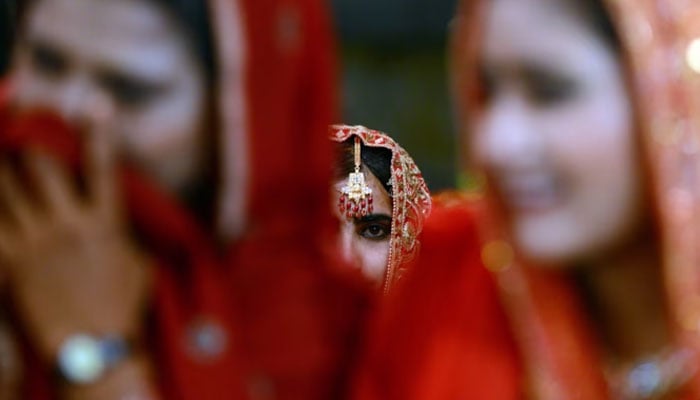The misogyny toll
Dowry, in the Pakistani context, most often refers to demands for cash, jewellery, gifts and other valuables
The practice of giving and/or demanding dowry is one of the most entrenched social problems in Pakistan and, like many of our other problems, it disproportionately impacts women. Dowry, in the Pakistani context, most often refers to demands for cash, jewellery, gifts and other valuables by the groom’s family from the family of the bride. It is akin to a form of extortion where the groom’s family can exploit the social pressure to have daughters married for monetary gain. Refusal or inability to pay a dowry can often mean the end of a woman’s marital prospects. Just last week (May 18), a member of the Punjab Assembly claimed that around 13.5 million women in Pakistan were unable to get married as their families could not arrange a dowry while arguing that dowry is unnecessary in the presence of inheritance laws ensuring a woman’s right to inherited property and calling for a law banning the practice, citing the example of India.
With an estimated 80 per cent of the Pakistani population earning Rs32000 per month or less, an exorbitant dowry is simply beyond the reach of most families. When widespread poverty is combined with entrenched social taboos against unmarried women, many families can feel pressured to take out huge loans in order to pay a dowry. However, in some cases, the demands do not simply stop once a wedding is done and can continue after a woman is married. Refusal or inability to pay can then lead to domestic abuse and violence, with some reports estimating that around 2000 dowry-related deaths are reported each year. There are several laws in Pakistan that restrict how much dowry families can demand and also overly ostentatious wedding celebrations and gifts. Specifically, the 2016 amendment to the Dowry and Bridal Gifts (Restriction) Act 1976 criminalizes the demand for a dowry by the bridegroom or any person on his behalf while also setting the limit for any voluntary dowry at Rs50000 and Rs20000 in urban and rural areas, respectively. Sadly, this remains a country where laws are rarely followed and people often try and get away with what they can. Particularly when it comes to embedded social traditions, unless there is an agreement between both sides not to adhere to a particular norm such as dowry, it is likely to be carried out regardless of what the law says.
That people in the 21st Century can still demand money from a woman’s parents for marriage as though they are doing them some kind of favour by taking their daughter off their hands is reflective of the fact that many Pakistani women are still seen as less worthy than men and are second-class citizens when it comes to the protection of their rights. While stricter laws against dowry might have some impact, it is unlikely that they will eradicate the practice. The experience of neighbouring India, where dowry-related deaths and abuse are still a problem, can attest to this. What is needed is a cultural transformation that ends with women being viewed as just as valuable, capable and worthy of jobs, property and education as men.
-
 All You Need To Know Guide To Rosacea
All You Need To Know Guide To Rosacea -
 Princess Diana's Brother 'handed Over' Althorp House To Marion And Her Family
Princess Diana's Brother 'handed Over' Althorp House To Marion And Her Family -
 Trump Mobile T1 Phone Resurfaces With New Specs, Higher Price
Trump Mobile T1 Phone Resurfaces With New Specs, Higher Price -
 Factory Explosion In North China Leaves Eight Dead
Factory Explosion In North China Leaves Eight Dead -
 Blac Chyna Opens Up About Her Kids: ‘Disturb Their Inner Child'
Blac Chyna Opens Up About Her Kids: ‘Disturb Their Inner Child' -
 Winter Olympics 2026: Milan Protestors Rally Against The Games As Environmentally, Economically ‘unsustainable’
Winter Olympics 2026: Milan Protestors Rally Against The Games As Environmentally, Economically ‘unsustainable’ -
 How Long Is The Super Bowl? Average Game Time And Halftime Show Explained
How Long Is The Super Bowl? Average Game Time And Halftime Show Explained -
 Natasha Bure Makes Stunning Confession About Her Marriage To Bradley Steven Perry
Natasha Bure Makes Stunning Confession About Her Marriage To Bradley Steven Perry -
 ChatGPT Caricature Prompts Are Going Viral. Here’s List You Must Try
ChatGPT Caricature Prompts Are Going Viral. Here’s List You Must Try -
 James Pearce Jr. Arrested In Florida After Alleged Domestic Dispute, Falcons Respond
James Pearce Jr. Arrested In Florida After Alleged Domestic Dispute, Falcons Respond -
 Cavaliers Vs Kings: James Harden Shines Late In Cleveland Debut Win
Cavaliers Vs Kings: James Harden Shines Late In Cleveland Debut Win -
 2026 Winter Olympics Snowboarding: Su Yiming Wins Bronze And Completes Medal Set
2026 Winter Olympics Snowboarding: Su Yiming Wins Bronze And Completes Medal Set -
 Trump Hosts Honduran President Nasry Asfura At Mar-a-Lago To Discuss Trade, Security
Trump Hosts Honduran President Nasry Asfura At Mar-a-Lago To Discuss Trade, Security -
 Cuba-Canada Travel Advisory Raises Concerns As Visitor Numbers Decline
Cuba-Canada Travel Advisory Raises Concerns As Visitor Numbers Decline -
 Anthropic Buys 'Super Bowl' Ads To Slam OpenAI’s ChatGPT Ad Strategy
Anthropic Buys 'Super Bowl' Ads To Slam OpenAI’s ChatGPT Ad Strategy -
 Prevent Cancer With These Simple Lifestyle Changes
Prevent Cancer With These Simple Lifestyle Changes




